This ‘Good Omens’ Theory About Crowley’s Angelic Past Seems More and More Likely
I don’t even need my tinfoil hat, this one just makes sense.
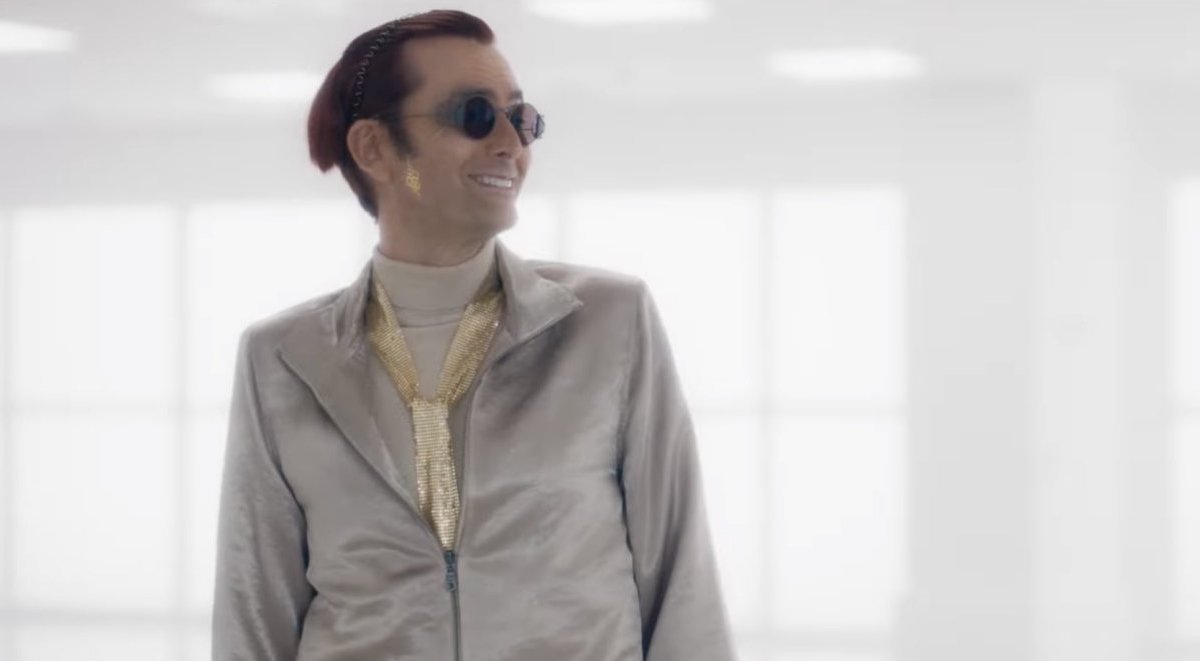
By now I think we can all agree that the second season of Good Omens, which premiered on Prime Video on July 28, did all sorts of emotional battering on us. Neil Gaiman—the series’ showrunner and the author together with Terry Pratchett of the 1990 book on which it is based—had promised us a “gentle, quiet romance” and we all fell into this textbook bit of trolling. It’s amazing.
Of course, the fandom discourse has been rampant ever since the show was made available to stream—anything with that sort of finale is bound to stir up responses, even more so if it’s such a beloved piece of content like Good Omens. The theories about what is going to happen in the already-planned season three are everywhere, but so are insightful pieces of meta about this season’s characters and the decisions we’ve seen them take on the screen.
Among all this fandom activity there’s one particular theory that has me going completely feral, especially because it’s something that I’ve also believed from pretty much the first moments of season one and that I think has only gotten more and more proof during this second season. And that’s Crowley’s previous angelic identity.
*** Spoilers ahead for the entirety of the second season of Good Omens. Be warned. ***
It all starts with Crowley’s powers
The very first scene of this second season introduced us to a character we had never seen before—David Tennant’s Crowley as he was before he fell, an angel still busy in the creation of the universe. We actually see him crank up the engine of the universe and make the stars, a nice echo back to him mentioning galaxies and far-away planets in season one as he contemplates running away from Armageddon.
We also see his first-ever meeting with Michael Sheen’s Aziraphale, which didn’t happen in the Garden of Eden as we were led to believe in season one but actually way before the first humans ever walked the Earth. During this interaction, Aziraphale introduces himself, but Crowley doesn’t offer his own name back—the first time he does name himself is in Eden, and he’s already Crowley then. Or, well, Crawly.
This leaves the matter of Crowley’s angelic identity open to theorizing—and the fans did very much so to their heart’s content. The thing is that Crowley’s identity maybe wouldn’t matter that much if the show hadn’t been very deliberate in showing us just how powerful of a demon he is.
In season one we see him stop time to give Adam “the Antichrist” Young a chance to make a plan before Satan breaks through the crust of the Earth. It’s unclear whether Aziraphale can do the same but chooses not to, or if it’s just a purely Crowley skill—what’s certain is that no one else is seen doing the same.
And in season two the evidence just piles up. Crowley worked very closely with the “concept designer” of the universe—a.k.a. God—and feels comfortable enough to go and question her when he doesn’t approve of her plans. He maintains a very high-security clearance, since he’s able to access files about Gabriel that Muriel tells him are reserved for “a Dominion or above”. All stuff that goes beyond what the ordinary Good Omens demon can do, which can only mean that Crowley was a pretty powerful angel before he Fell—and there are only two options as to whom that powerful angel might be, really.
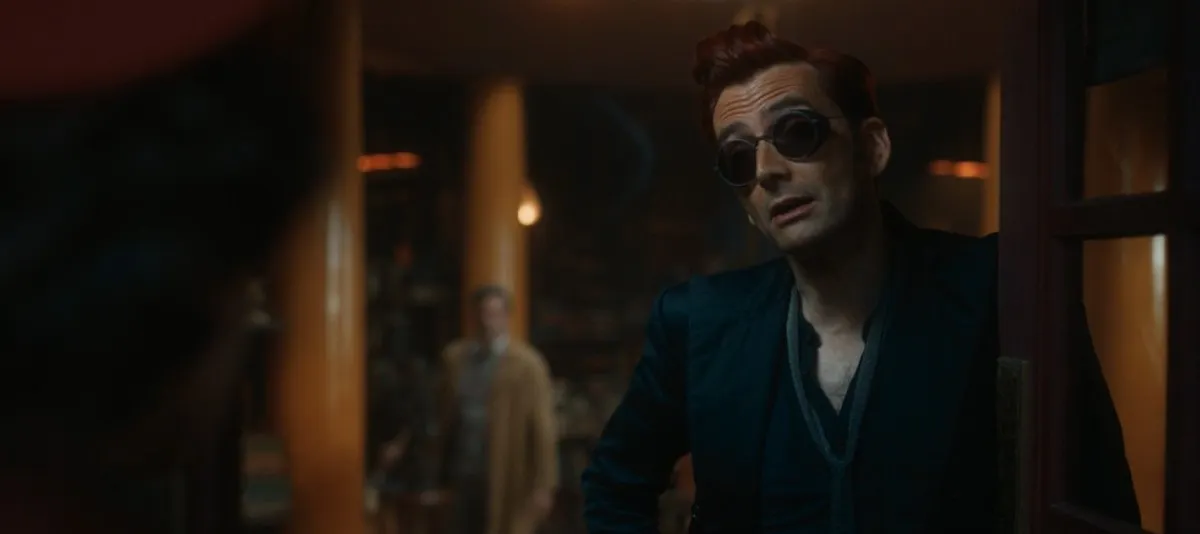
So who was Crowley before being Crawley?
The first option is for him to be the archangel Raphael, the only one of the four archangel who we haven’t seen or at least heard mentioned. Gabriel, Michael, and Uriel are all here, but their quarter is usually filled by another angel—Sandalphon in season one and Saraquael in season two—rather than Raphael, who might be the more obvious choice.
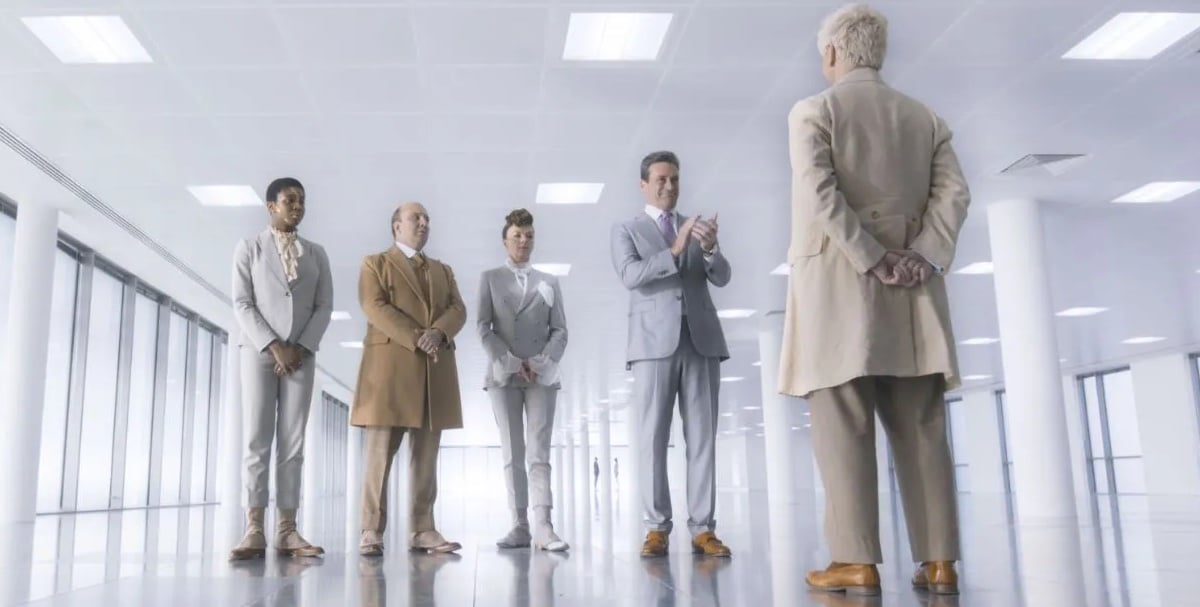
So if Raphael isn’t in Heaven, it might mean that he’s been cast down and is currently sauntering around the Earth in skinny jeans and custom sunglasses. The fact that Crowley takes such an interest this season in making sure Nina and Maggie end up together—he’s the one actually doing the trick with the rain—might be a nod to Raphael traditionally being considered the patron of lovers and marriage.
It’s certainly a possibility that would make sense, but there’s another one that fans seem to gravitate to and that I also favor—Crowley is actually Lucifer. Because come on! It’s all there!
The first and maybe the most obvious clue is that Crowley was the serpent that tempted Eve to eat the apple. Plus, let’s not forget that in episode three of season one we learn that it was Crowley who showed Jesus Christ all the kingdoms of the world while he was in the desert, referencing an episode mentioned in the Gospels of Matthew, Mark, and Luke. A fallen angel who was also the serpent of Eden and the one who tempted Jesus in the desert? That’s more than enough to ring any Lucifer-shaped bells in anyone’s mind.
But then there’s also the fact that Crowley set the universe in motion—with purple-tinted sparks, the same color as Gabriel’s eyes and so linked with power in the visual canon of the show, as Tumblr user @halemerry noted—and brought light to it at the very start of it all. And “Lucifer” quite literally means “light-bringer”.
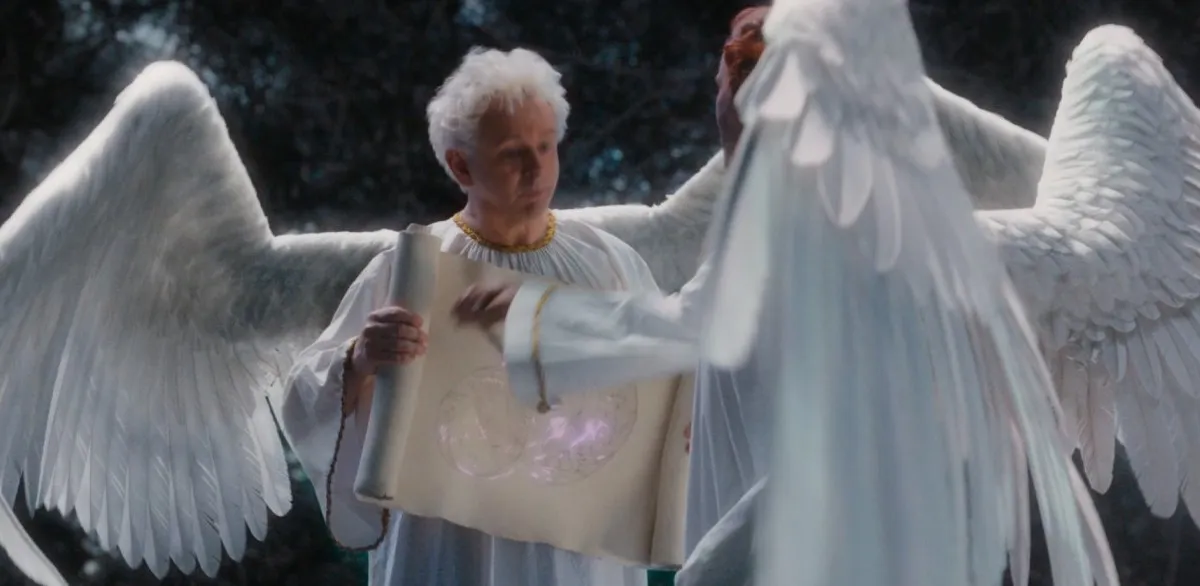
A question of memory
Now, I know what you’re going to say. We did indeed see Satan appear in Good Omens when he emerges to try and punish Adam for not bringing forward Armageddon. But then again, Lucifer and Satan weren’t always considered the same entity—their connection was made popular by John Milton’s 17th-century poem Paradise Lost.
And yes, Crowley does refer to Lucifer as something other than himself. In season one, when he’s getting spectacularly drunk after thinking Aziraphale had somehow died in the burning of his bookshop, he slurs that he didn’t really mean to fall but he just hung around with the wrong crowd, like “Lucifer and the guys”.
Sure, that could very well mean that Gaiman maybe didn’t consider the “Crowley was Lucifer” possibility since the beginning. But the whole issue of Gabriel’s memory in season two does reframe everything we’ve known so far about Crowley in a very interesting way.
As we saw during Crowley’s incursion in Heaven, it seems like the default way in which upstairs deals with soon-to-be-banned powerful angels is to erase their memories. So it’s not a stretch to think that the same thing might have happened to Crowley, who got hurled out of Heaven without his memories.
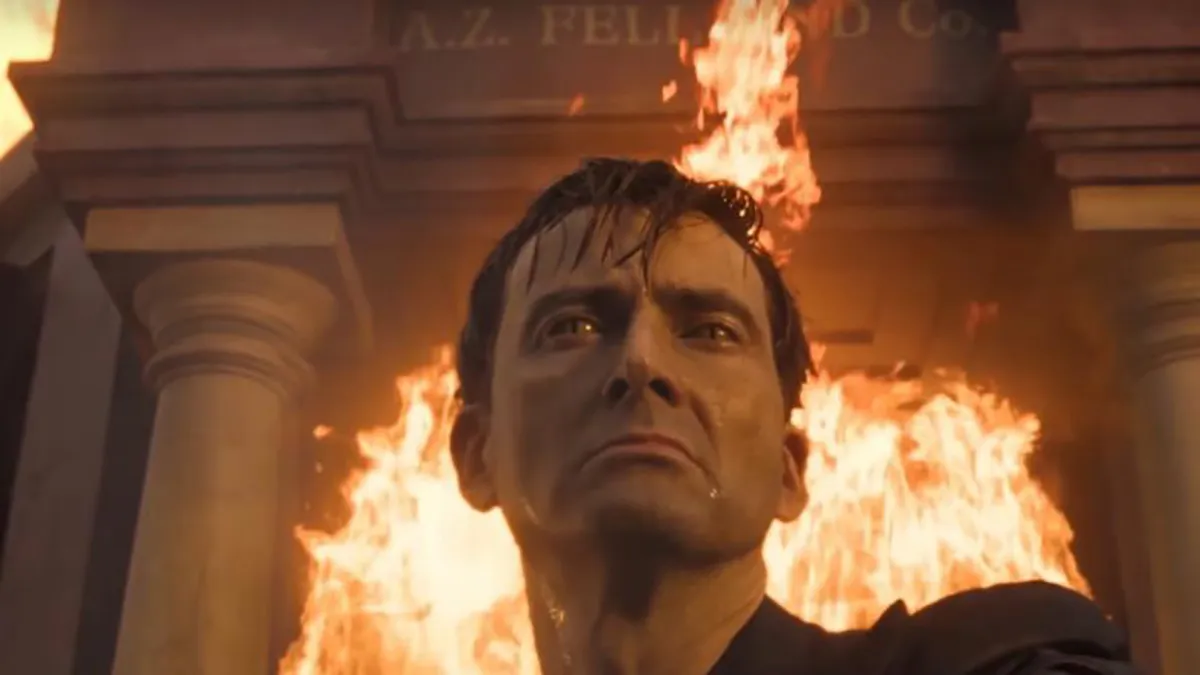
That would explain why he introduces himself again to Aziraphale in Eden as if he hasn’t already met him, why he doesn’t remember working with Saraquael or fighting with Furfur. And also why he seems particularly empathetic of Gabriel’s condition all throughout season two, despite Crowley very much not wanting Gabriel anywhere near Aziraphale or the bookshop. The way Crowley immediately understands Gabriel’s metaphor of being in a room with missing furniture might be a clue that he also got his memory wiped—but also, I believe, did some work in trying to get it back throughout his millennia on Earth.
Will we learn Crowley’s angelic name in season three?
Crowley’s former angelic identity might certainly grow to be a major storyline in season three. After all when Aziraphale offered to bring him back to Heaven and restore him to angelhood, Crowley made a point of telling him that he understands very well what Heaven is like, maybe even better than Aziraphale—and that would track with him being a once powerful angel that was cast out.
Besides, I am pretty convinced that the Metatron—who is definitely shaping up to be the big bad villain of season three—knows very well who Crowley was and is doing all his perfect manipulations to separate him from Aziraphale considering just how powerful the two are together. Just look at the magnitude of the miracle they performed when they were trying to be subtle—I’m sure that one of the major power players in Heaven is very concerned with what they could do if they were actually intent on doing something big.
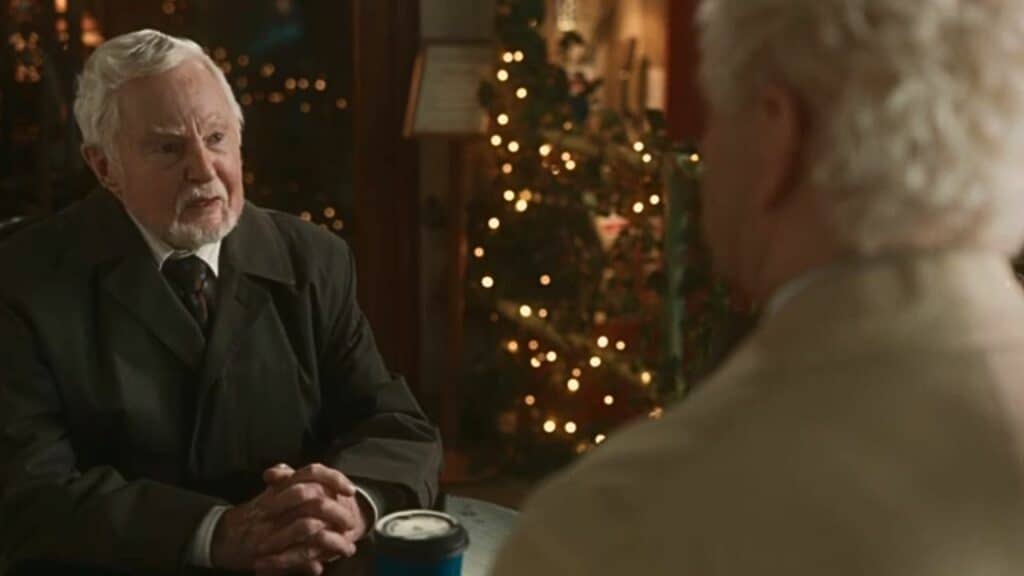
A dramatic revelation of Crowley’s former name somewhere between the mid-point of season three could certainly do wonders for the pathos of the show as well as for the romantic relationship between Crowley and Aziraphale. Words can’t express how much I would love to see David Tennant and Michael Sheen acts their absolute hearts out in a scene like this.
On the other hand, Crowley also did angrily remember Aziraphale that he no longer is the angel he used to be. So it would still be thematically coherent if we never get to learn who he was before he fell and if all of this remains a theory—what’s past is past, after all, and Crowley has developed his own sense of identity independent of Heaven and also of Hell.
(featured image: Prime Video)
Have a tip we should know? [email protected]